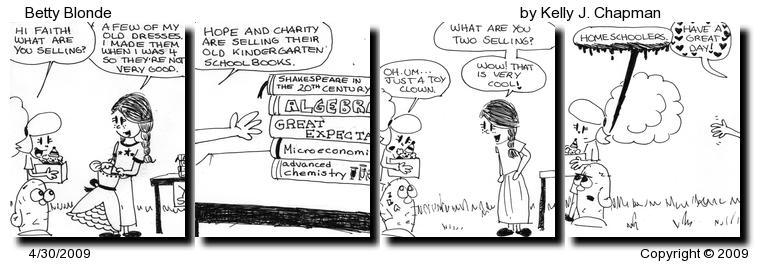This post is part of a narrative history of our homeschool. It is about why we chose to homeschool, what we did and how we did it. It is about our failures and frustrations as well as our successes. The plan is to make an honest accounting of it all for the benefit of ourselves and others. This is a work in progress which was started in late October 2014 after the kids had already skipped most or all of high school, Christian had earned a Bachelor’s degree in Mathematics (Summa Cum Laude), Kelly had earned a Bachelors degree in Statistics (Magna Cum Laude) and they were ensconced in funded PhD programs on the West Coast. I add to the narrative as I have time.
Kelly’s first grade year, our first year of homeschool, was a thing of beauty. We did “home-preschool” with Christian, too, so he would not feel left out. We loved every minute of it, but it was a lot of work–more work than I could sustain for two kids over the decade they would be in school. We followed the Classical Education, grammar stage methods from The Well Trained Mind book described in the previous post in this series. It really was wonderful.
Our only problem had to do with the fact that, unlike many homeschools, I (the dad) did all of the academic parts of the homeschool. That is not to say Lorena did not do anything. She did just as much as I, if not more–assuring the kids stayed on track to finish their assigned materials during the day, running to the library, zoo, piano lessons and a million other events, coordinating materials purchases and the million other administrative tasks required to do homeschool the way we wanted to do it.
I loved the entire process–identifying materials, buying materials, making schedules, making the overall plan, making and updating the daily plan and, especially, sitting with the kids to read, learn math facts, memorize Bible verses. I did this for Kelly’s entire first grade year. Coupled with my full time job that required an hour and a half of driving to and from work, I had virtually no time for anything other than work, church and homeschool.
Kelly spent two or three additional hours every day to work through a to-do list of assignments. She loved it. Mostly it consisted of reading some books, working on math, doing some art, writing reports and in her journal and that sort of thing. It was stuff she probably would have been doing anyway. We gave Christian a list of about a half an hour worth of pre-school things to-do, mostly consisting of doing a worksheet or two and participating in Kelly’s art projects with her.
Every night, when I got home from work, I sat with both of kids to teach, correct homework, memorize and read for two or three hours more hours. After the teaching and correction, I needed to spend another hour or so per night to go through the materials for the next day and assure they were at the right level and taught what I felt we should cover for each of the materials. I made up a list for each kid on the computer that Kelly could understand (Lorena helped Christian) and printed it out so they could no exactly what was required that next day.
Then, every weekend, I spent at least half a day in bookstores, art stores and libraries, hunting down materials. I never hit every subject on every weekend, but it was very rare when we had a weekend available only to relax and hang out with the family. Really, it was too much. I knew I could not maintain such a pace of work as long as I had a full time job. We decide we would find a different way to homeschool or put the kids in government school the next year. We decided on government school for the next year for a number of reasons I discuss in the next post in this series. In addition, I delve more deeply into the topic of why we moved away from the Well Trained Mind in another post here.
We will never regret having done it exactly what we did for Kelly’s first grade year. We might have been exhausted, but we accomplished a lot with much joy. It served the kids well. They loved the program and the materials, were not burdened with too much work and learned a lot. Lorena and I knew the later grades would require even more work as Christian moved into “real” homeschool and the materials got more difficult. So something had to change if we wanted to continue homeschooling.
Betty Blonde #210 – 05/06/2009

Click here or on the image to see full size strip.



